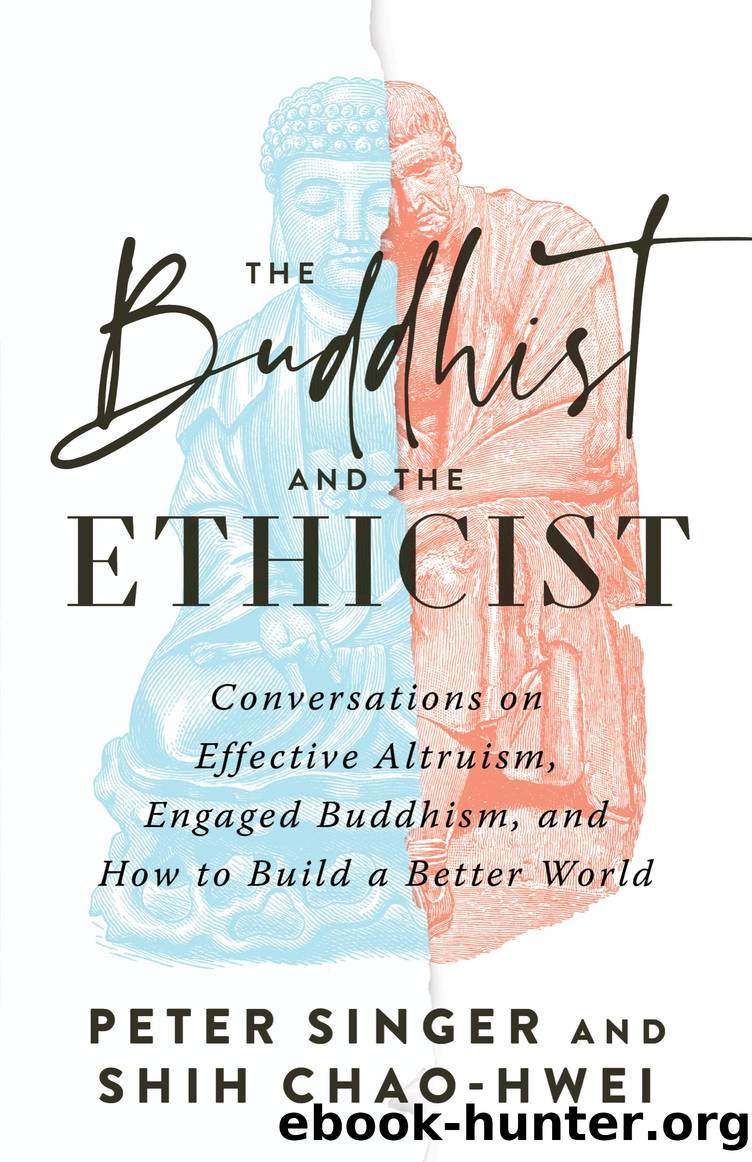The Buddhist and the Ethicist by Peter Singer & Shih Chao-Hwei

Author:Peter Singer & Shih Chao-Hwei [Singer, Peter & Chao-Hwei, Shih]
Language: eng
Format: epub
Publisher: Shambhala
Published: 2023-12-12T00:00:00+00:00
* * *
â
Singer: In thinking about our discussion last night, I feel I should emphasize that although we ended on a disagreement, there is also an important element of agreement between us. We agree that concern for sentient beings such as animals is more important than concern for a human embryo. In contrast, for most Christians who have discussed this issue, the embryo, precisely because it is human, is more important than the life of any nonhuman animal. Most Christians who campaigned against the use of embryos to obtain stem cells did not object to killing animals in research, or even to research that caused suffering to animals. So I think it is important to recognize our agreement here on the idea that sentient life takes precedence and that ethically the most important thing to do is to avoid inflicting suffering on sentient beings.
Chao-Hwei: Yes, we agree on that. We agree on not inflicting suffering on sentient life. We differ, though, on whether we should respect the strong survival instinct that even a nonconscious being may have. I believe that even nonconscious beings have a strong desire to maintain their survival instinct and that we should respect this desire and not interfere with it unless necessary.
I would also like to clarify that, even though I disagree with discrimination between species, which means that I disagree with those Christians who think that humans are superior to other species, I do think that the potential of the embryo is significant. A human embryo does have the potential to develop into a more fulfilling or more fulfilled state of existence than any other animal species. When we destroy the embryo, we are taking away all these potential developments.
From the Buddhist perspective, life is a continuous process. If the embryonic stage is interfered with by external forces and is forcibly terminatedâthat is, if the embryo does not surviveâthen it still has the opportunity to start another life cycle and will develop again. This means it will immediately seek the place of âthe next stop.â However, will that next stop still be the chance to be born as a human being? Not necessarily. In contrast to animals, a fully developed embryo that is nourished by parental love has more internal and external resources to develop into a fulfilling and beneficial state. An embryo will turn into an individual with a mature personality, emotional and rational balance, as well as a sense of judgment and the ability to tell right from wrong. They will become a person who is able to help not only themself but also others, rather than becoming an animal, which is entirely dominated by instinct. So from the Buddhist view, to develop into a conscious being who can keep cultivating their awareness is a precious opportunity. For a developing embryo, whether it is born as a human or not will lead it to a very different path of life. I hope this point of view is clear.
Singer: Can we take a moment
Download
This site does not store any files on its server. We only index and link to content provided by other sites. Please contact the content providers to delete copyright contents if any and email us, we'll remove relevant links or contents immediately.
The Way of Zen by Alan W. Watts(6608)
Ego Is the Enemy by Ryan Holiday(5424)
The Art of Happiness by The Dalai Lama(4126)
The Book of Joy by Dalai Lama(3978)
Why Buddhism is True by Robert Wright(3448)
Spark Joy by Marie Kondo(3301)
Shift into Freedom by Loch Kelly(3194)
Happiness by Matthieu Ricard(3041)
A Monk's Guide to a Clean House and Mind by Shoukei Matsumoto(2913)
The Lost Art of Good Conversation by Sakyong Mipham(2653)
The Meaning of the Library by unknow(2568)
The Unfettered Mind: Writings from a Zen Master to a Master Swordsman by Takuan Soho(2310)
The Third Eye by T. Lobsang Rampa(2262)
Anthology by T J(2210)
Red Shambhala by Andrei Znamenski(2194)
The Diamond Cutter by Geshe Michael Roach(2059)
Thoughts Without A Thinker: Psychotherapy from a Buddhist Perspective by Epstein Mark(2014)
Twilight of Idols and Anti-Christ by Friedrich Nietzsche(1893)
Advice Not Given by Mark Epstein(1880)
